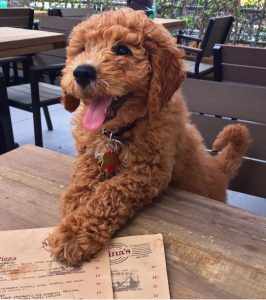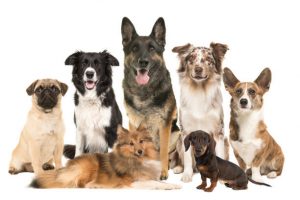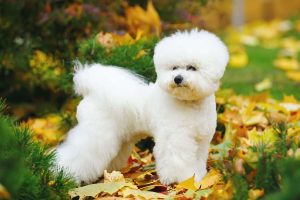The Snickerdoodle-Dog, with its charming name and endearing demeanor, has captured the hearts of many dog lovers around the world. This relatively new hybrid breed is a cross between the Poodle and the Cocker Spaniel, resulting in a delightful mix of intelligence, playfulness, and affection.
With their soft, curly coats and expressive eyes, Snickerdoodle-Dogs have quickly become beloved companions in households seeking warmth and happiness. In this article, we delve into the unique characteristics of the Snickerdoodle-Dog breed and explore the significant role they play in bringing joy to families.

Snickerdoodle -Dogs are known for their friendly and sociable nature, making them excellent pets for individuals and families alike. Whether they’re curled up on the couch for a cuddle session or eagerly chasing after a favorite toy in the backyard, these dogs have an innate ability to brighten the spirits of those around them.
In this comprehensive guide, we’ll discuss the various ways Snickerdoodle-Dogs contribute to the well-being of their owners and the special bond that forms between humans and these delightful furry friends. From their impact on mental health to their role in family dynamics, we’ll explore the many facets of life with a Snickerdoodle-Dog.
Whether you’re considering adding a Snickerdoodle-Dog to your family or simply curious about this delightful breed, join us as we celebrate the love, warmth, and happiness that Snickerdoodle-Dogs bring into our homes and hearts.
The Snickerdoodle Dog Breed: Characteristics and Traits
The Snickerdoodle Dog, a charming Size and Appearance:
Cross breed between the Poodle and Cocker Spaniel, possesses a unique blend of traits that make them stand out as delightful companions for families. Below are some key characteristics and traits of the Snickerdoodle-Dog
Cross breed:
- Snickerdoodle-Dogs typically range in size from small to medium, inheriting traits from both parent breeds.
- They have a soft, curly coat that can vary in color, including shades of cream, brown, black, or a combination of these hues.
- With expressive eyes and an endearing expression, Snickerdoodle-Dogs often capture attention wherever they go.
- Temperament:
- Known for their friendly and affectionate nature, Snickerdoodle-Dogs thrive on companionship and enjoy being part of a family.
- They are intelligent and eager to please, making them easy to train and suitable for households with children or other pets.
- Snickerdoodle-Dogs are often described as gentle, loyal, and sociable, forming strong bonds with their human companions.
- Playfulness and Energy:
- Despite their small to medium size, Snickerdoodle-Dogs are surprisingly energetic and playful, enjoying both indoor and outdoor activities.
- They have a playful demeanor and love interactive games, such as fetch or tug-of-war, providing entertainment and exercise for both dog and owner.
- Regular walks and playtime sessions are essential to keep Snickerdoodle-Dogs mentally stimulated and physically fit.
- Adaptability:
- Snickerdoodle-Dogs are known for their adaptability to various living environments, including apartments, suburban homes, or rural settings.
- They are versatile companions, capable of adjusting to different lifestyles and routines, as long as they receive adequate attention, exercise, and mental stimulation.
Overall, the Snickerdoodle-Dog breed embodies the best qualities of its parent breeds, offering companionship, affection, and joy to families fortunate enough to welcome them into their homes.
Snickerdoodle-Dog’s Impact on Mental Health and Well-being
The presence of a Snickerdoodle-Dog in the home can have profound effects on mental health and overall well-being. Their endearing nature and affectionate demeanor contribute to a positive environment that fosters emotional support and companionship. Below are some ways in which Snickerdoodle-Dogs positively impact mental health:
- Stress Reduction:
- Interacting with a Snickerdoodle-Dog has been shown to reduce stress levels by triggering the release of oxytocin, a hormone associated with feelings of happiness and relaxation.
- Simply petting or cuddling with a Snickerdoodle-Dog can have a calming effect, helping individuals unwind after a long day and relieving tension.
- Anxiety Relief:
- The presence of a Snickerdoodle-Dog can provide comfort and reassurance to individuals experiencing anxiety or panic attacks.
- Snickerdoodle-Dogs are intuitive creatures that often sense their owners’ emotions and respond with empathy, offering a sense of security and stability during times of distress.
- Companionship and Social Connection:
- Snickerdoodle-Dogs are known for their social nature and love being around people, making them ideal companions for individuals who may feel isolated or lonely.
- Owning a Snickerdoodle-Dog encourages social interaction, as they often serve as conversation starters and facilitate connections with other dog owners in the community.
- Emotional Support:
- Snickerdoodle-Dogs excel in providing emotional support to their owners, offering unconditional love, companionship, and a listening ear (or rather, a wagging tail).
- Their presence can help individuals feel more secure, valued, and understood, especially during challenging times or periods of transition.
Overall, the bond between humans and Snickerdoodle-Dogs goes beyond mere companionship, playing a significant role in promoting mental health, emotional well-being, and overall happiness.
Building Strong Bonds: The Relationship Between Owners and Snickerdoodle-Dogs

The relationship between owners and their Snickerdoodle-Dogs is one characterized by profound affection, companionship, and mutual understanding. These delightful hybrid dogs have a knack for capturing the hearts of their owners, forging strong bonds that endure a lifetime. Below are some aspects highlighting the special relationship between owners and Snickerdoodle-Dogs:
- Unconditional Love and Affection:
- Snickerdoodle-Dogs are known for their loving and affectionate nature, showering their owners with unconditional love and devotion.
- Their expressive eyes, wagging tails, and playful demeanor create an instant connection with their human companions, fostering a deep sense of attachment and affection.
- Companionship and Loyalty:
- Snickerdoodle-Dogs are loyal companions, always by their owner’s side through thick and thin.
- Whether it’s accompanying their owners on outdoor adventures, snuggling on the couch, or simply being present during quiet moments, Snickerdoodle-Dogs provide unwavering companionship and support.
- Shared Experiences and Memories:
- Owners and their Snickerdoodle-Dogs share countless memorable experiences together, creating cherished memories that last a lifetime.
- From playful romps in the park to cozy evenings spent by the fireplace, each moment shared with a Snickerdoodle-Dog becomes a cherished part of the owner’s life story.
- Emotional Support and Understanding:
- Snickerdoodle-Dogs possess a remarkable ability to sense their owner’s emotions and offer comfort and solace during times of need.
- Their empathetic nature allows them to provide emotional support and understanding, serving as a source of strength and encouragement for their owners.
- Enhanced Quality of Life:
- The presence of a Snickerdoodle-Dog enriches the lives of their owners in countless ways, bringing joy, laughter, and a sense of purpose to each day.
- The bond between owners and their Snickerdoodle-Dogs enhances overall well-being, promoting happiness, and fulfillment in both human and canine companions.
In essence, the relationship between owners and Snickerdoodle-Dogs is a testament to the profound connection that can exist between humans and animals, enriching lives and bringing warmth and happiness to homes across the world.
Snickerdoodle Dog ‘s Role in Family Life
The presence of a Snickerdoodle Dog in a household can have a transformative impact on family dynamics, fostering a sense of joy, togetherness, and unconditional love. These delightful hybrid dogs seamlessly integrate into family life, becoming beloved members of the household. Let’s explore the various ways Snickerdoodle-Dogs enhance family dynamics and relationships:
- Companionship and Comradery:
- Snickerdoodle-Dogs bring an abundance of companionship and comradery to family life, forging strong bonds with each member of the household.
- Their playful antics, affectionate nature, and boundless energy infuse the home with warmth and laughter, creating a sense of unity and togetherness among family members.
- Shared Activities and Adventures:
- Snickerdoodle-Dogs eagerly participate in family activities and adventures, whether it’s going for walks in the park, playing fetch in the backyard, or snuggling on the couch during movie nights.
- Their enthusiastic involvement in family rituals and traditions strengthens the family bond, creating shared experiences and lasting memories for everyone to cherish.
- Emotional Support and Comfort:
- Snickerdoodle-Dogs provide invaluable emotional support and comfort to each family member, offering a listening ear and a comforting presence during both joyful and challenging times.
- Their innate ability to sense emotions allows them to provide solace and reassurance, promoting emotional well-being and resilience within the family unit.
- Teaching Responsibility and Compassion:
- Caring for a Snickerdoodle-Dog instills a sense of responsibility and compassion in family members, especially children who learn the importance of nurturing and caring for another living being.
- Through daily interactions and caregiving tasks, children develop empathy, patience, and a deeper understanding of the needs of others, fostering personal growth and character development.
- Unconditional Love and Acceptance:
- Perhaps most importantly, Snickerdoodle-Dogs offer unconditional love and acceptance to each member of the family, regardless of age, background, or circumstance.
- Their unwavering devotion and affection create a supportive and nurturing environment within the home, where every family member feels valued, accepted, and deeply loved.
In essence, the role of a Snickerdoodle-Dog in family life goes beyond mere companionship; they become cherished confidants, loyal friends, and treasured members of the family, enriching the lives of all who are fortunate enough to welcome them into their homes.

Training and Care for Snickerdoodle-Dogs
Welcoming a Snickerdoodle-Dog into your home comes with the responsibility of providing proper training and care to ensure their well-being and happiness. Here, we’ll delve into essential tips and advice on training and caring for Snickerdoodle-Dogs, covering crucial aspects such as socialization, exercise, grooming, and nutrition:
- Socialization:
- Early socialization is key to shaping a Snickerdoodle-Dog’s behavior and temperament. Introduce your puppy to various people, animals, and environments from a young age to help them become confident and well-adjusted adults.
- Organize playdates with other dogs, enroll in puppy kindergarten classes, and expose your Snickerdoodle-Dog to different sights, sounds, and experiences to promote positive socialization.
- Training:
- Consistent and positive reinforcement-based training methods are recommended for Snickerdoodle-Dogs. Use rewards such as treats, praise, and toys to motivate and encourage desired behaviors.
- Focus on basic obedience commands such as sit, stay, come, and heel, gradually progressing to more advanced training exercises. Be patient, firm, and consistent in your training approach.
- Exercise:
- Snickerdoodle-Dogs are energetic and playful by nature, requiring regular exercise to maintain their physical and mental health. Aim for at least 30 minutes to an hour of exercise each day, including walks, playtime, and interactive games.
- Provide opportunities for both indoor and outdoor activities to keep your Snickerdoodle-Dog stimulated and engaged, preventing boredom and destructive behaviors.
- Grooming:
- Regular grooming is essential to keep your Snickerdoodle-Dog’s coat clean, healthy, and free from mats and tangles. Brush their coat several times a week to remove loose fur and prevent shedding.
- Trim their nails as needed, clean their ears regularly, and brush their teeth to maintain good oral hygiene. Schedule professional grooming appointments as required, especially for haircuts and coat maintenance.
- Nutrition:
- Provide a balanced and nutritious diet tailored to your Snickerdoodle-Dog’s age, size, and activity level. Choose high-quality dog food formulated for small to medium-sized breeds and avoid feeding them table scraps or unhealthy treats.
- Monitor their food intake and adjust portion sizes accordingly to prevent obesity and maintain a healthy weight. Ensure access to fresh water at all times to keep your Snickerdoodle-Dog hydrated.
By prioritizing training and care, you can ensure that your Snickerdoodle-Dog thrives in their new environment, enjoying a fulfilling and happy life as a beloved member of your family.
Snickerdoodle-Dog: A Source of Joy and Laughter
Introducing a Snickerdoodle-Dog into your life brings an abundance of joy and laughter, as these delightful canine companions have a knack for brightening even the dreariest of days. Let’s explore the heartwarming stories and experiences of Snickerdoodle-Dogs bringing boundless happiness into households:
- Heartwarming Tales:
- Owners of Snickerdoodle-Dogs often share heartwarming anecdotes of the special moments they’ve shared with their furry friends. From snuggles on the couch to playful romps in the backyard, these stories highlight the deep bonds formed between humans and their beloved pets.
- Endearing Personalities:
- Snickerdoodle-Dogs are known for their charming and endearing personalities, characterized by their affectionate nature and playful demeanor. Their boundless energy and zest for life infuse every moment with laughter and joy, making them cherished companions for individuals and families alike.
- Playful Antics:
- Snickerdoodle-Dogs have a mischievous side that often leads to hilarious and entertaining antics. Whether it’s chasing their tail, playing fetch with gusto, or performing silly tricks for treats, these furry comedians never fail to put a smile on their owners’ faces.
- Comic Relief:
- Life with a Snickerdoodle-Dog is never dull, thanks to their innate ability to find humor in everyday situations. Their quirky quirks and funny quirks often serve as a source of comic relief, turning mundane moments into memorable adventures filled with laughter and joy.
- Unconditional Love:
- Perhaps the greatest gift a Snickerdoodle-Dog offers is their unwavering love and devotion. They greet their owners with boundless enthusiasm and shower them with affection, reminding them of the purest form of love that exists between humans and animals.
As you welcome a Snickerdoodle-Dog into your home, prepare to embark on a journey filled with laughter, love, and endless moments of joy. With their playful antics and unwavering loyalty, these furry companions are sure to bring warmth and happiness into your life each and every day.
Conclusion: Embracing the Love and Happiness of Snickerdoodle-Dogs
In conclusion, Snickerdoodle-Dogs hold a special place in the hearts of their owners, bringing an abundance of love, warmth, and happiness into homes across the globe. Their affectionate nature, playful antics, and unwavering loyalty make them cherished companions and beloved members of the family.
Throughout this exploration of the role of Snickerdoodle-Dogs in spreading joy and laughter, it’s evident that these delightful canine companions have a profound impact on the lives of their human counterparts. From providing emotional support during challenging times to adding an extra dose of fun to everyday moments, Snickerdoodle-Dogs enhance the overall well-being and happiness of their owners in countless ways.
As we reflect on the heartwarming stories and experiences shared by Snickerdoodle-Dog owners, it’s clear that these furry friends hold a special place in the hearts of those who are lucky enough to have them in their lives. Their playful personalities, unconditional love, and boundless enthusiasm serve as a constant source of comfort, companionship, and joy.
In light of the positive impact Snickerdoodle-Dogs have on bringing warmth and happiness into homes, I encourage readers to consider welcoming one of these delightful companions into their lives. Whether you’re seeking a loyal companion, a source of laughter, or simply a furry friend to brighten your days, a Snickerdoodle-Dog is sure to bring love and happiness into your life in ways you never thought possible. So open your heart and home to a Snickerdoodle-Dog today, and embark on a journey filled with love, laughter, and unforgettable moments together.







